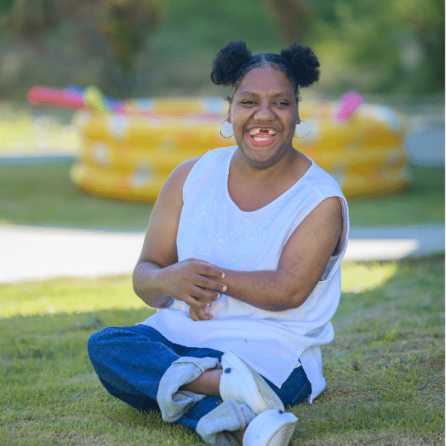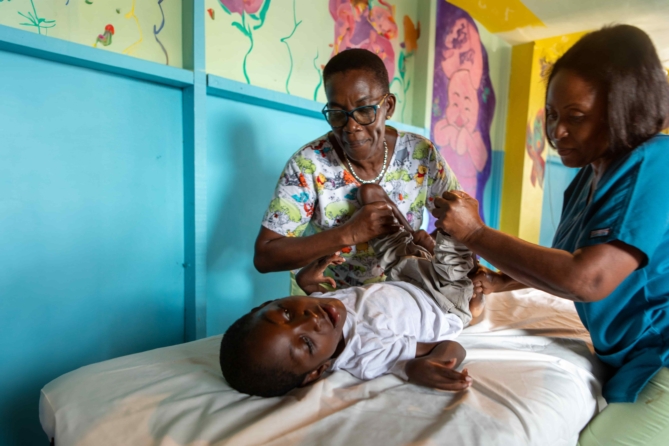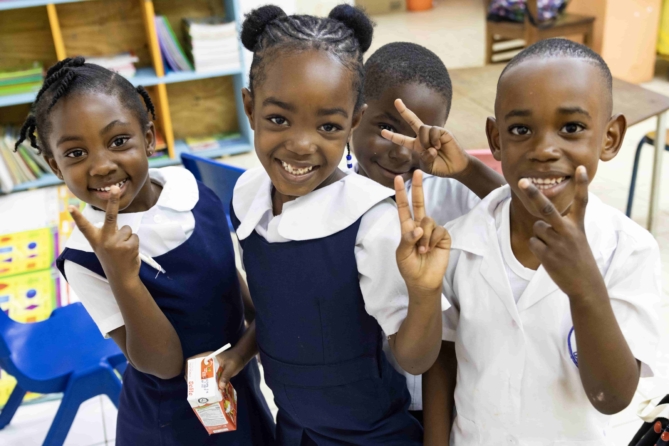
MSC apostolates provide shelter for residents of all ages —from infants to adults. When they are younger, residents live in cottages in groups, but as they get older, they are extended an opportunity for semi-independent living at MSC’s home for adults, Jacob’s Ladder.
Chula is a resident of Hogar Immanuel in Dominican Republic who MSC is blessed to welcome in our community. Since 2004, when she was 12 years old, Chula has received care for epilepsy and cognitive disabilities. Now 33 years old, she loves talking to friends and playing with her dolls. Chula can rest assured that she is infinitely loved and will never be abandoned by her Mustard Seed Family.
2. Healthcare

Many children come to MSC unable to walk or communicate on their own because of their disabilities. Over our 40-plus years of caring for the most vulnerable, we have learned what it takes to holistically care for people with conditions like cerebral palsy, hydrocephalus, Down syndrome, Autism, and other physical or developmental disabilities. We know that these conditions require specialized medical care — care that can sometimes be critical and extensive — that their families could not access without our help.
Safe in their Mustard Seed homes, residents receive 24-hour nursing care, attend specialized medical appointments, take life-giving medications, and participate in physical and occupational therapy led by trained Mustard Seed caregivers.
Children and adults arrive at Mustard Seed with hopeless prognoses; yet, we are continually blessed to witness both physical, emotional, and spiritual transformations. We see this development in the way they smile and laugh — living each day in the knowledge they are protected and cared for. Sometimes, however, a resident unexpectedly breaks through a despairing diagnosis: for instance, Irene, a young girl who was told she would never walk takes her first steps or Keni, a young man with HIV who was cast off by society showcases his talents as a mural artist to the city.
Jevaughn, who has been living at Blessed Assurance in Jamaica for 15 years, is one resident who never let his bleak medical diagnosis stop him from spreading his joy. Through severe visual impairment, Jevaughn has shared his immense joy and even won the MSC talent show multiple times. Soon, however, Jevaughn will need corrective eye surgery to reattach his retinas. MSC hopes to provide this surgery to Jevaughn with the support of the generous MSC family.
3. Education

Across the globe, over 90% of children with disabilities do not attend school. We believe that no child should be left behind … that every child should have the chance to empower themselves with education; that’s why we provide excellent and accessible early education to impoverished communities.
Through our Little Angels Learning Centers, children and adults with disabilities who would otherwise be unable to access education are given the opportunity to learn and contribute intellectually and creatively to their community. Our educational program is also open to residents and children in need who live in surrounding communities. There, everyone is included in foundational lessons that will uplift them to a successful future. Some residents attend schools outside of the MSC apostolates as well.
Beyond preschool, we train adults with disabilities to learn new skills in a variety of training programs that cover mathematics, sewing, baking, farming, and technology.
Kimoya, a resident of Gift of Hope in Jamaica, came to MSC in 2016 with ataxia and severe hearing loss. She was just two years old when she arrived: she was unable to walk or communicate on her own. With intensive therapy and fitted leg splints provided by Mustard Seed, Kimoya now loves to run around and play with her friends. After making remarkable strides in sign language, he now attends the Caribbean Christian School for the Deaf.
Mustard Seed Communities is changing the lives of children and adults with disabilities. We deeply care about how residents are thriving — physically, mentally, and emotionally. Our caregivers intentionally create an accepting and loving environment that assures children who have already experienced the trauma of being left behind that they have a forever place to belong. When we say that “no person should be abandoned twice,” we mean it: we are committed to providing a lifelong home for children and adults with disabilities.
 Dominican Republic
Dominican Republic
 Jamaica
Jamaica
 Education
Education
 Shelter
Shelter